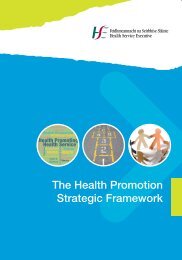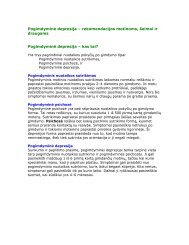Taking antibiotics for colds and flu? - Health Promotion Unit
Taking antibiotics for colds and flu? - Health Promotion Unit
Taking antibiotics for colds and flu? - Health Promotion Unit
You also want an ePaper? Increase the reach of your titles
YUMPU automatically turns print PDFs into web optimized ePapers that Google loves.
<strong>Taking</strong> <strong>antibiotics</strong><br />
<strong>for</strong> <strong>colds</strong> <strong>and</strong> <strong>flu</strong>?<br />
There’s no point.<br />
Colds <strong>and</strong> <strong>flu</strong> are caused by<br />
a virus <strong>and</strong> <strong>antibiotics</strong> do<br />
not work on viruses.<br />
talk to your GP or pharmacist or visit www.hse.ie
What are <strong>antibiotics</strong>?<br />
Antibiotics are medicines used to treat<br />
infections caused by bacteria. Antibiotics<br />
don’t work against infections caused by<br />
viruses, such as <strong>colds</strong> <strong>and</strong> <strong>flu</strong>. So there’s no<br />
point taking <strong>antibiotics</strong> to treat a cold or <strong>flu</strong>,<br />
<strong>and</strong> no point asking your doctor to prescribe<br />
them <strong>for</strong> a cold or <strong>flu</strong>.<br />
<strong>Taking</strong> <strong>antibiotics</strong> when you don’t need them, like <strong>for</strong> a cold<br />
or <strong>flu</strong>, is a waste. It can also mean that they won’t work when<br />
you really need them <strong>for</strong> a serious infection. This is called<br />
antibiotic resistance <strong>and</strong> it happens when bacteria are exposed<br />
to <strong>antibiotics</strong> <strong>and</strong> learn to resist them. <strong>Taking</strong> <strong>antibiotics</strong> when<br />
they are not needed also puts you at risk of side effects, like a<br />
rash, upset stomach or diarrhoea.<br />
When are <strong>antibiotics</strong> not needed?<br />
Most common infections are caused by viruses. Antibiotics do not<br />
work against viruses. Most viral illnesses get better themselves<br />
without <strong>antibiotics</strong>. The table below helps you to know when<br />
you’re likely to need an antibiotic - <strong>and</strong> when you aren’t.<br />
Common Cause:<br />
Virus<br />
• Head cold, runny nose,<br />
cough<br />
• Sore throat, sinusitis<br />
• Ear infections in children<br />
• Vomiting <strong>and</strong> diarrhoea<br />
Antibiotics rarely<br />
needed<br />
Common Cause:<br />
Bacteria<br />
• Urine / kidney infections<br />
• Persisting cough, cough<br />
in people with chest<br />
problems, high fever or<br />
very unwell<br />
• Skin infections<br />
e.g. cellulitis<br />
• Meningitis<br />
Antibiotics may be<br />
needed
When is it OK <strong>for</strong> me or my child to take <strong>antibiotics</strong>?<br />
Your doctor may prescribe <strong>antibiotics</strong> <strong>for</strong> infections that are<br />
caused by bacteria, like some chest infections, kidney infections,<br />
some ear infections <strong>and</strong> meningitis.<br />
If you or your child needs <strong>antibiotics</strong>, make sure you take them<br />
exactly as prescribed. If the course isn’t completed, some<br />
bacteria may be left in your body <strong>and</strong> become resistant to<br />
<strong>antibiotics</strong>. Never keep or re-use left over <strong>antibiotics</strong> <strong>for</strong> the<br />
next time you, your child, or any other family member is sick.<br />
Why didn’t my doctor prescribe an antibiotic?<br />
It is because your infection is likely caused by a virus <strong>and</strong> it’s<br />
safer to let it clear up on its own. Remember, <strong>antibiotics</strong> are<br />
no use against a virus. The length of time you can expect most<br />
common infections to last is:<br />
Ear infections: around 4 days<br />
Sore throat: around 1 week<br />
Common cold (runny nose): around 1½ weeks<br />
Sinus infections: around 2½ weeks<br />
Cough (which often happens after a common cold):<br />
around 3 weeks<br />
If your illness lasts longer than this, ask your doctor or pharmacist<br />
<strong>for</strong> advice.<br />
Ask your doctor or pharmacist:<br />
When should I start to feel better?<br />
What should I do if I don’t start to feel better by then?<br />
Is there anything I can do to help myself get better?<br />
When <strong>and</strong> how should I seek further help?<br />
How should I treat a cold, cough or sore throat?<br />
The best way to treat most <strong>colds</strong>, coughs or sore throats<br />
is to drink plenty of <strong>flu</strong>ids <strong>and</strong> get some rest. Ask your<br />
pharmacist <strong>for</strong> advice about over-the-counter remedies,<br />
<strong>and</strong> read the table overleaf <strong>for</strong> in<strong>for</strong>mation on how to treat<br />
some common symptoms.
Symptoms<br />
Runny nose, blocked<br />
nose or congestion<br />
Sore throat<br />
Treatment<br />
Nasal decongestant spray,<br />
oral decongestant syrup<br />
or tablets. Menthol &<br />
eucalyptus oil preparations.<br />
Honey & lemon,<br />
anaesthetic lozenges.<br />
Paracetamol or ibuprofen.<br />
Cough in an adult Antitussive <strong>for</strong> dry cough -<br />
to stop you coughing.<br />
Mucolytic or expectorant<br />
<strong>for</strong> chesty cough - to help<br />
you break up mucus.<br />
Fever, pain, joint or<br />
muscle aches<br />
Cough in a child<br />
Paracetamol or ibuprofen.<br />
Discuss with your doctor<br />
or pharmacist.<br />
If you are taking medicines <strong>for</strong> any other conditions, you must<br />
check with your doctor or pharmacist be<strong>for</strong>e you take any overthe-counter<br />
remedies.<br />
Key things to remember<br />
• Most common infections get better by themselves –<br />
without <strong>antibiotics</strong><br />
• <strong>Taking</strong> <strong>antibiotics</strong> when you don’t need them can put<br />
your health, <strong>and</strong> the health of your family, at risk<br />
• If your doctor decides that you need an antibiotic,<br />
be sure you take it exactly as prescribed<br />
• Your pharmacist can advise you on over-the-counter<br />
remedies that can help to treat many common infections<br />
For more in<strong>for</strong>mation, visit hse.ie/<strong>antibiotics</strong>
















